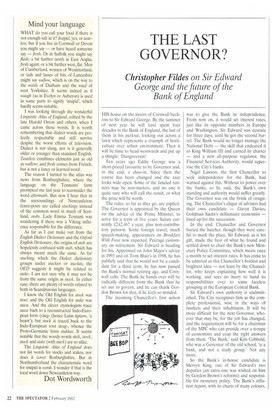Mind your language
WHAT do you call your food if there is not enough salt in it? Insipid, yes, or tasteless, but if you live in Cornwall or Devon you might say — or have heard someone say — fresh. Or in Suffolk you might say flash; a bit further north in East Anglia, fresh again; or a bit further west, flat. Men of Cumberland, women of Westmorland, or lads and lasses of bits of Lancashire might say wallow, which is on the way to the walsh of Durham and the wauf of west Yorkshire. It seems indeed as if waugh (as in Evelyn or Auberon) is used in some parts to signify 'insipid', which hardly seems suitable.
I was looking through the wonderful Linguistic Atlas of England, edited by the late Harold Orton and others, when I came across these words. It is worth remembering that dialect words are perfectly respectable and still survive despite the worst efforts of television. Dialect is not slang, nor is it generally older or younger than standard English. Tasteless combines elements just as old as wallow; and fresh comes from French, but is not a fancy or learned word.
The reason I turned to the atlas was news from Roxburghshire, where the language on the Tennants' farm prompted me last year to reconsider the word aftermath. But now I hear that in the surroundings of Newcastleton fence-posts are called stuckings instead of the common word in much of Scotland, stobs. Lady Emma Tennant was wondering if there was a Viking influence responsible for the difference.
As far as I can make out from the English Dialect Dictionary and the Oxford English Dictionary, the origins of stob are hopelessly confused with stub, which has always meant much the same. As for snicking, which the Dialect dictionary groups under stucken or stuckin, the OED suggests it might be related to stake. I am not sure why it may not be from the same origin as stock. In either case, there are plenty of words related to both in Scandinavian languages.
I know the Old English for stock was stocc and the Old English for stake was staca. And the clever etymologists trace staca back to a reconstructed Indo-European form (s)teg(hence Latin tignum, 'a beam'); but stock is traced back to the Indo-European root steug-, whence the Proto-Germanic form stukkas. It seems notable that the woody words stick, stock, stuck and stake (with stack) are so alike.
The Linguistic Atlas of England does not list words for stocks and stakes, nor does it cover Roxburghshire. But in Northumberland the characteristic word for insipid is wersh. I wonder if that is the local word down Newcastleton way.
Dot Wordsworth






























































 Previous page
Previous page